|
A
review of the Planet Ocean and Seamaster
Professional
|
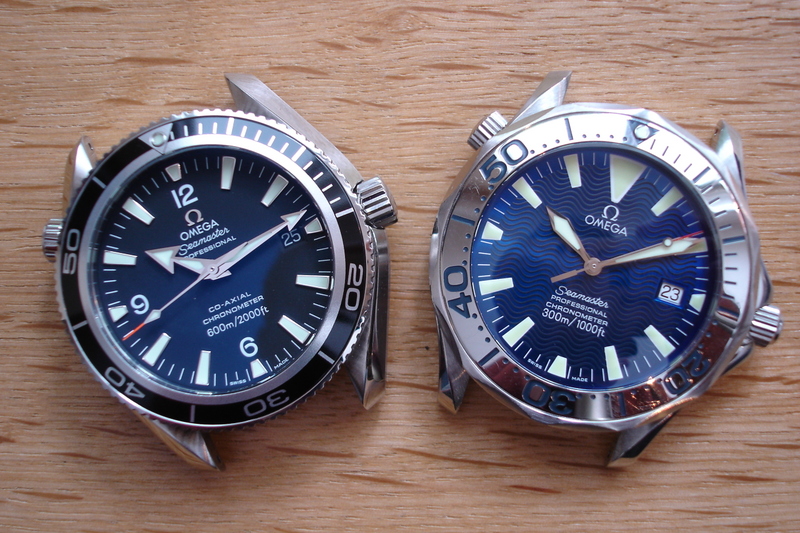
|
|
Posted by:
Downtown
Mike
|
- Copyright ©
2006
- Some
Rights Reserved
|
Dec 14, 2006
- 11:36 AM
|
|
INDEX:
|



|
|
|
|
INTRODUCTION
|



|
|
Since I own both of the latest versions of Omega dive
watches, I thought it would be a worthwhile endeavour to do
a comparison between the two. The first is the latest and
greatest from Omega; the Planet Ocean 2201.50.00 - 42mm
black on black on bracelet. The other is the Omega Seamaster
Professional: Electric Blue 2255.80.00 - 41mm blue face with
polished bezel on bracelet. Ideally, I would have liked to
compare my PO to the black on black SMP (2254.80.00) as it
would have been a more of an "apples to apples" type of
review, but sometimes you just have to work with what you
got.
|
Model
Name:
|
Planet
Ocean:
|
Seamaster
Professional:
|
|
Model
Reference:
|
2201.50
|
2255.80
|
|
Omega Calibre:
|
2500C
|
1120
|
|
Base Calibre
|
ETA 2892-A2
|
ETA 2892-A2
|
|
Movement Type
|
Automatic
|
Automatic
|
|
VPH
|
25,200
|
28,800
|
|
Power Reserve
|
48 hrs
|
44 hrs
|
|
Water Resistance
|
600 m
|
300 m
|
|
|
CASE
|



|
|
Case
Dimensions (in mm):
|
Planet
Ocean:
|
Seamaster
Professional:
|
|
Advertised Size
|
42
|
41
|
|
Top Lug to Bottom Lug
|
47.7
|
47.3
|
|
Lug Width
|
20
|
20
|
|
Width + Crown
|
44.5
|
45.7
|
|
Width: 2:00 - 8:00
|
42.7
|
41.2
|
|
Bezel Diameter
|
39.8
|
40.8
|
|
Crown Diameter
|
6.6
|
5.3
|
|
He Valve Diameter
|
5.8
|
5.3
|
|
Thickness
|
14.5
|
11.5
|
|
|
Thickness:
|



|
|
Case
Dimensions (in mm):
|
Planet
Ocean:
|
Seamaster
Professional:
|
|
Thickness
|
14.5
|
11.5
|
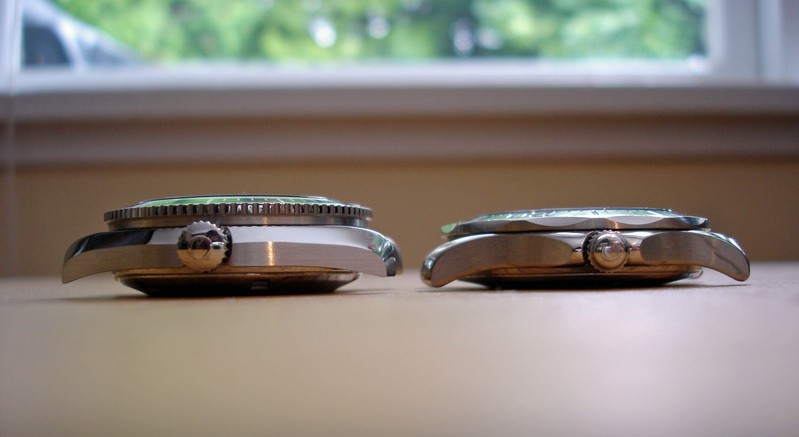
The SMP measures in at 11.5 mm, while the PO is moderately
thicker at 14.5 mm. After wearing the SMP you do notice the
extra 3mm on your wrist, but the size isn't such where it
has directly resulted in a door frame knock.
|
|
Dial
and Hands:
|



|
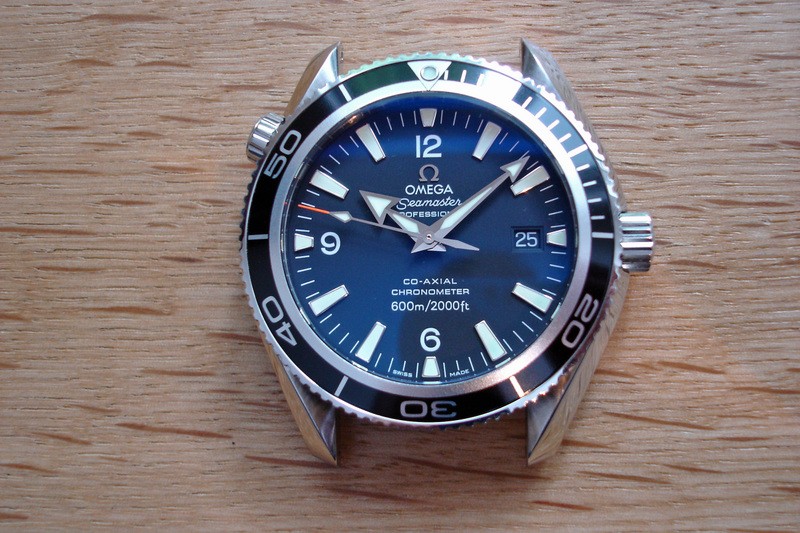 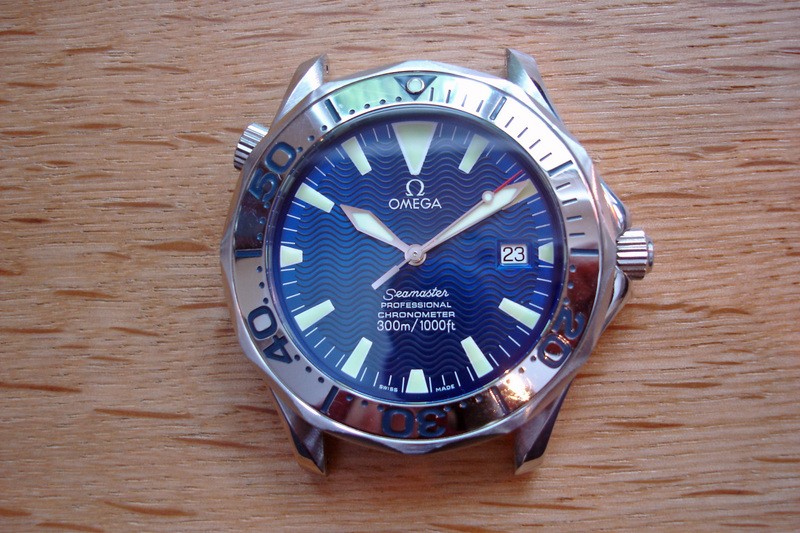
You have got to love the wave pattern on the Seamaster (at
least I do); I think it gives the watch another dimension,
particularly with the "Electric Blue" colouring. It can
appear as a brilliant bright blue or a much darker, almost
black blue depending on how the light hits the dial. I must
admit that initially I was slightly disappointed that the
Planet Ocean didn't have such a pattern on it. Nevertheless
the matte black dial is very legible, with the applied hour
markers producing a slight sparkle. The applied hour markers
along with the Omega symbol give the watch a more expensive
and refined appearance, while the SMP is sportier. One
feature I appreciate on the PO is that the date wheel is
black with white numbers; which really finishes it
off.
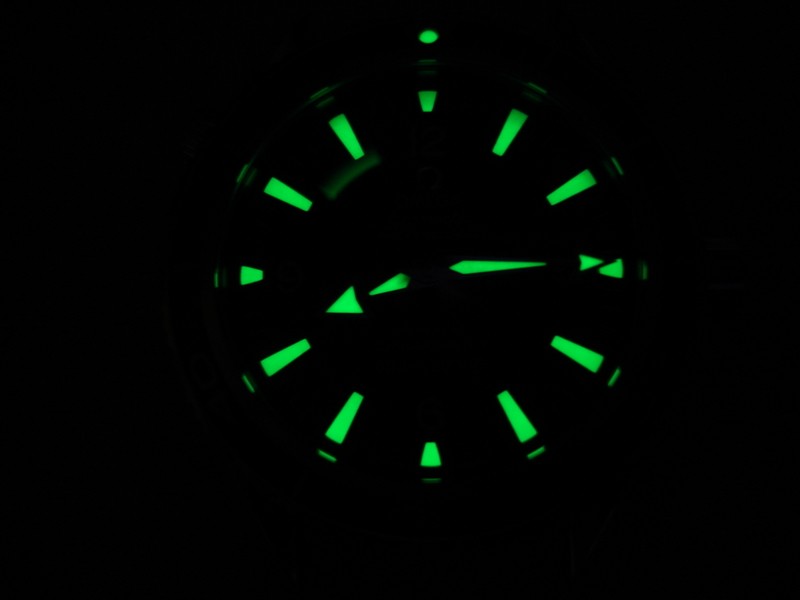 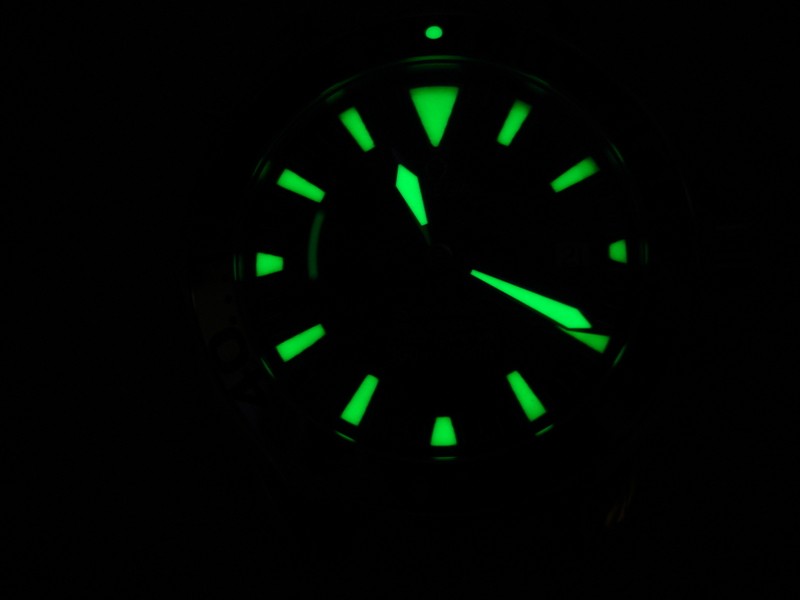
The sword hands on the SMP scream legibility, even at night.
The generous amounts of superluminova on both the hands and
dial of the SMP make it one of the most legible watches I
have ever seen. The arrow hands on the PO are also quite
legible, but slightly less than that of the SMP. Style wise
I prefer the PO hands, but for actual time-telling ability,
the SMP reigns supreme.
|
|
Bezel:
|



|
|
Case
Dimensions (in mm):
|
Planet
Ocean:
|
Seamaster
Professional:
|
|
Bezel Diameter
|
39.8
|
40.8
|
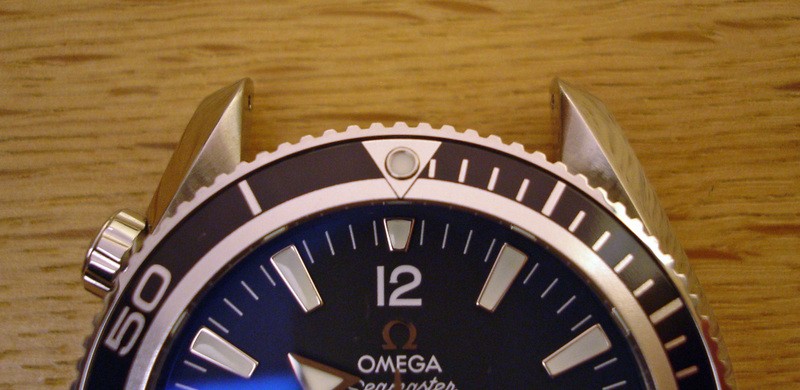 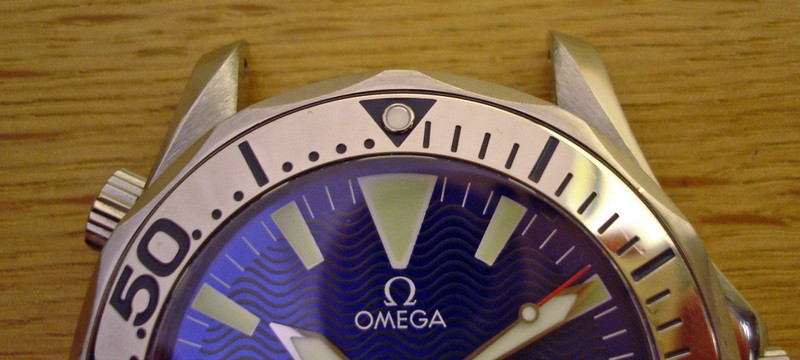
The polished stainless steel bezel insert on the SMP gives
the watch a slightly flashier look than that of its sportier
black SMP sister, the 2254.50. It takes 120 clicks to rotate
the uni-directional bezel counter clockwise. The grip on the
sides of the bezel is satisfactory, but you have to pay
attention when you are working it as it can prove to be a
bit slippery. The polished bezel insert has a tendency to
acquire fingerprints and reflect glare (especially when
taking its picture!), and thus takes away some of the
legibility of the minute markers on the bezel. It could
probably be argued that this diminishes this particular
watches' functionality as a pure dive / tool watch. I would
classify it as a functional fashion watch.
With the Planet Ocean you will find the coin edge bezel (the
45.5 mm has more of a scalloped edge), and is a great deal
easier to use than that of the SMP. The ratcheting (also in
half minute increments) feels firm and seems more precise,
but that may have more to do with its' age relative to my
somewhat older SMP. Interestingly, the printing on the bezel
in on the outer 2/3's, leaving a narrow ring of exposed
metal to surround the crystal. The legibility of the minute
markers, sliver on top of black on the bezel is
excellent.
|
|
Crystal:
|



|
|
Both watches use slightly domed, 30mm
diameter sapphire crystal. The SMP has anti-reflective
coating on the inside, whereas the PO has the coating on
both the inside and outside of the crystal. The Planet
Ocean's crystal is thicker than that of the SMP, which in
turn helps give the PO the higher water resistance.
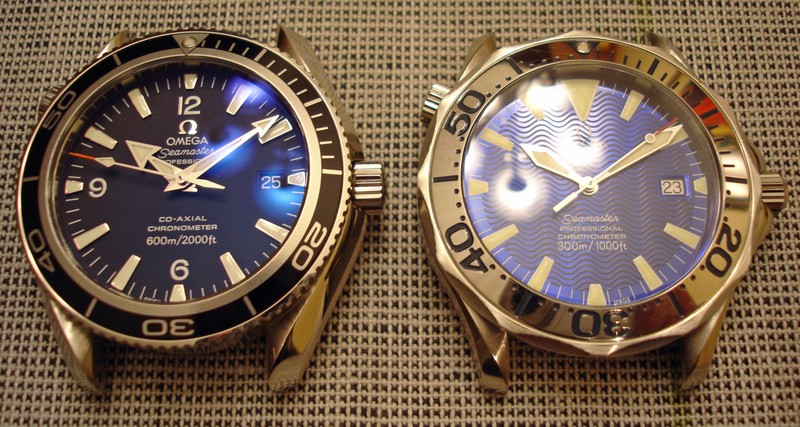
The AR coating on the PO is simply great; it can appear that
the crystal is missing from the watch altogether. Some
people have indicated that they don't like AR coating on the
outside of the crystal for the following reasons:
* there is the possibility of it getting scratched off,
* it gives the watch a slight blue tinge when viewed in a
bright environment,
* fingerprints and smudges show more prominently on the AR
surface.
From personal experience, I have not had any problems with
the AR coating on the PO. While it is true that fingerprints
are more noticeable on the crystal, I feel that the benefit
of having an "invisible" crystal outweighs this
detraction.
|
|
Crown:
|



|
|
Case
Dimensions (in mm):
|
Planet
Ocean:
|
Seamaster
Professional:
|
|
Crown Diameter
|
6.6
|
5.3
|
|
He Valve Diameter
|
5.8
|
5.3
|
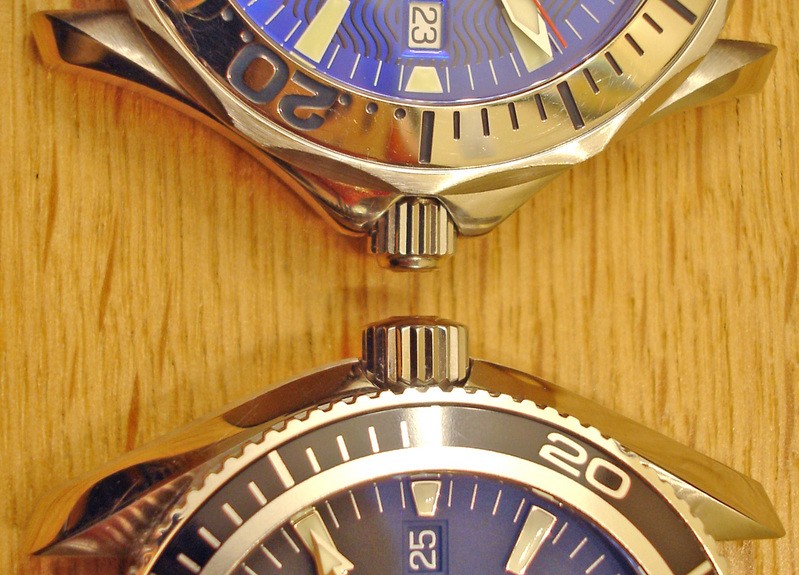
I think Omega got the proportion and design of the crown
just right with the PO, as the larger (6.6 mm) size allows
for easier operation and yet does not result in any skin
rubbing or irritation. By way of comparison, the crown on
the SMP seems a little on the small side at 5.3 mm.
Furthermore, winding the PO is extremely smooth and
quiet!
Both watches have the manually
operated, crown type helium escape valve on the case (both
located at just after 10:00). The PO He valve is 0.5 mm
larger in diameter than the one on the SMP.
|
|
Case
Back:
|



|
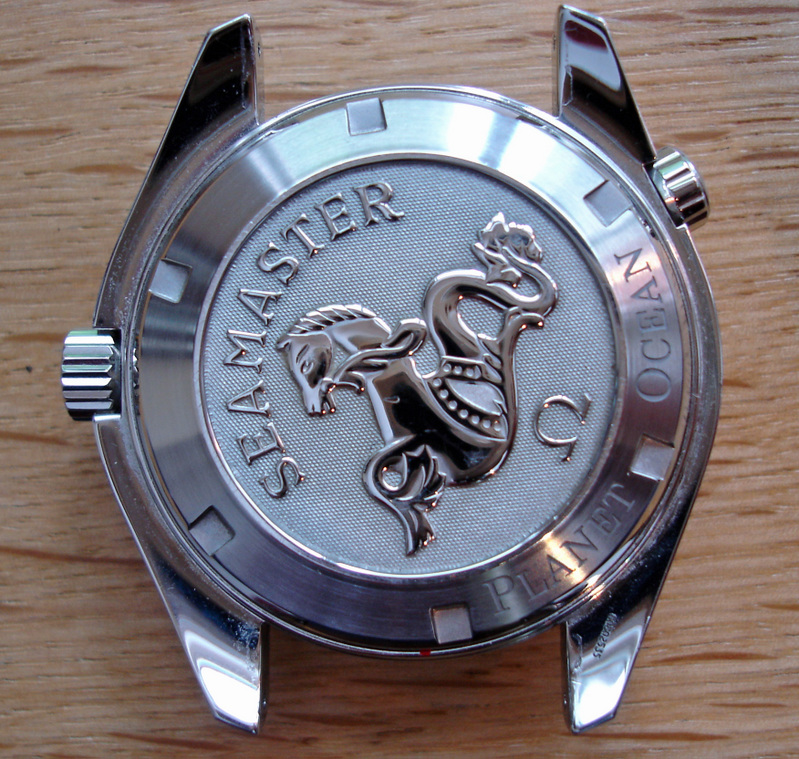 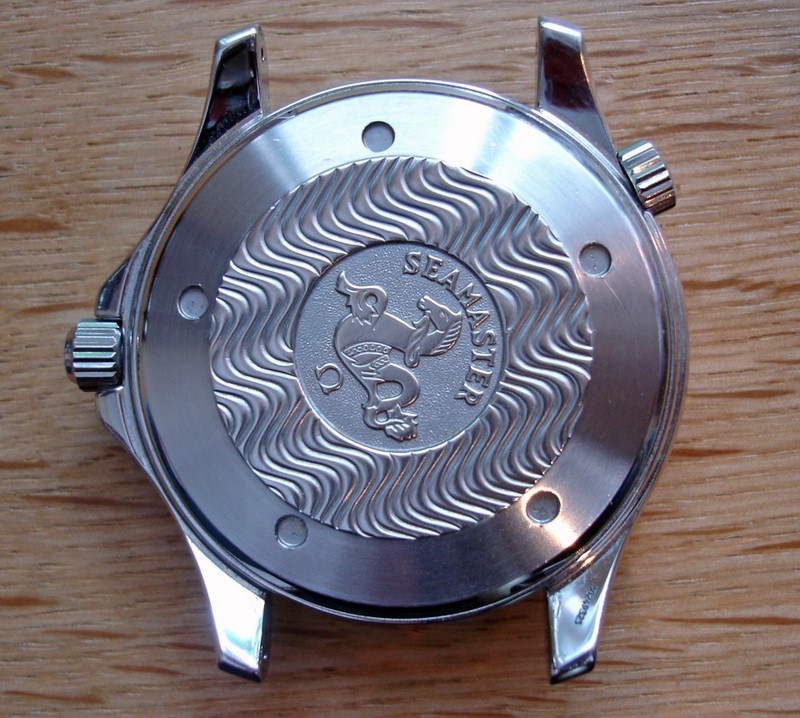
The SMP has the familiar hippocampus surrounded in the wave
pattern, along with 5 holes for the case-back opening tool.
This case-back is the same on the other versions of the
Seamaster Professional line. Of note, the most recent
editions of the non co-axial "Bond" watch (2531.80.00) have
an anti-counterfeiting symbol, which looks like a hybrid of
an Omega symbol and an image of Earth engraved on the
case-back. For some reason, Omega has omitted this symbol on
the Planet Ocean (but it is present on the Planet Ocean
Chronograph)
The Planet Ocean has a larger hippocampus on a matte
hammered background. On the perimeter there are 6 notches
for the caseback tool, along with "PLANET OCEAN" engraved.
The detail on the case-back is superb, and adds to the fit
and finish of the watch.
|
|
Water
Resistance:
|



|
|
Model
Name:
|
Planet
Ocean:
|
Seamaster
Professional:
|
|
Water Resistance
|
600 m
|
300 m
|
Planet Ocean is rated to an impressive 600 metres, compared
to 300 metres with the SMP. The higher water resistance can
be attributed to the thicker case and crystal of the Planet
Ocean. Both watches offer more than enough protection.
|
|
Appearance:
|



|
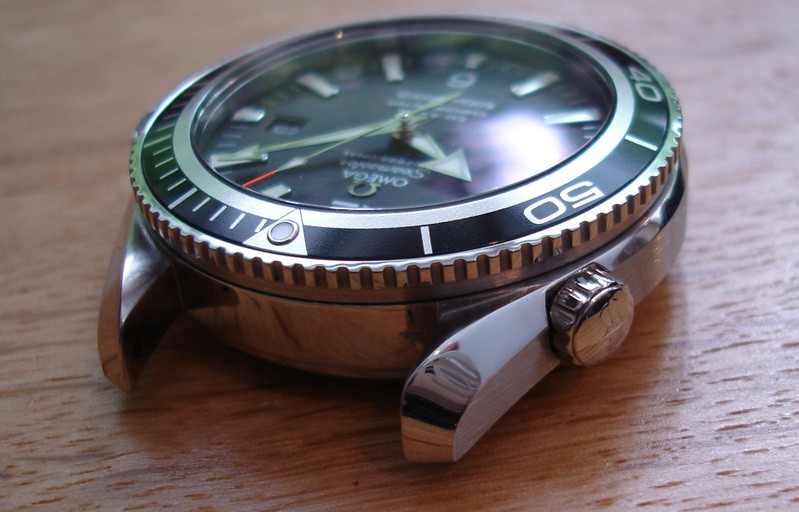 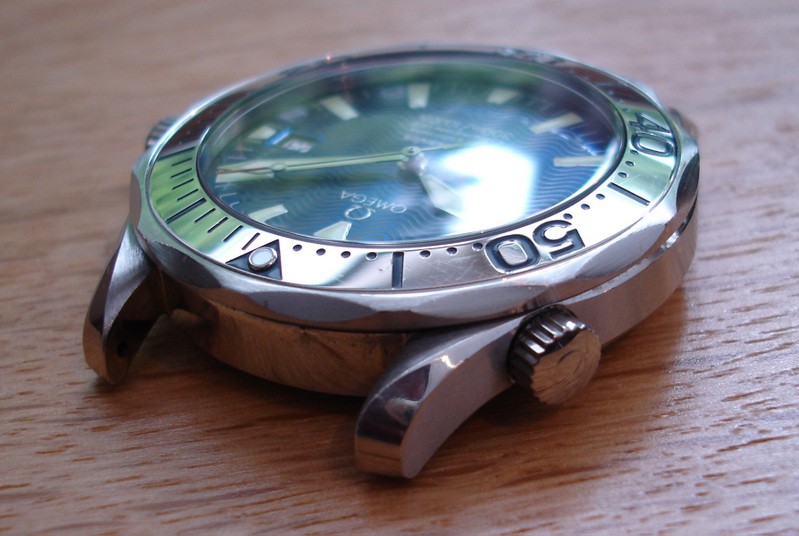
The SMP is 41 mm across and 11.5 mm thick, and has very nice
curves on the lugs. If you look at the lugs closely, you
will notice that they are made up of three angles, which
eliminate any sharp corners on the case. It's a very
comfortable watch to wear.
The PO is 42mm wide and is moderately thicker at 14.5mm. The
shape and details of the case are outstanding, with the
outside edge being in a brushed finish. When the two watches
are viewed side by side, the SMP appears to be bigger (at
least wider). This is due to the SMP having a 1 mm wider
bezel and a width including crown being 1.2 mm wider than
the PO. However, the Planet Ocean is actually 0.4 mm
longer from lug to lug and wider from 2:00 to 8:00 by 1.5
mm.
|
|
BRACELET
|



|
|
Bracelet
Dimensions (in mm):
|
Planet
Ocean:
|
Seamaster
Professional:
|
|
Bracelet Number
|
1580/952
|
1610/930
|
|
End Link Number
|
952
|
930
|
|
Width at Case
|
19.6
|
19.6
|
|
Width at Clasp
|
17.6
|
17.6
|
|
Thickness at Case
|
4.7
|
3.5
|
|
Thickness at Clasp
|
4.7
|
3.5
|
|
Clasp Width
|
18.1
|
18.1
|
|
Clasp Thickness
|
6.4
|
6.4
|
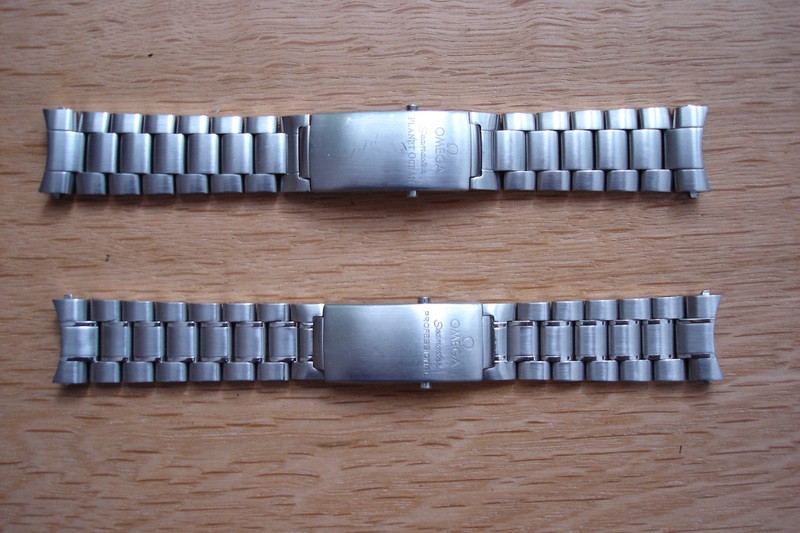 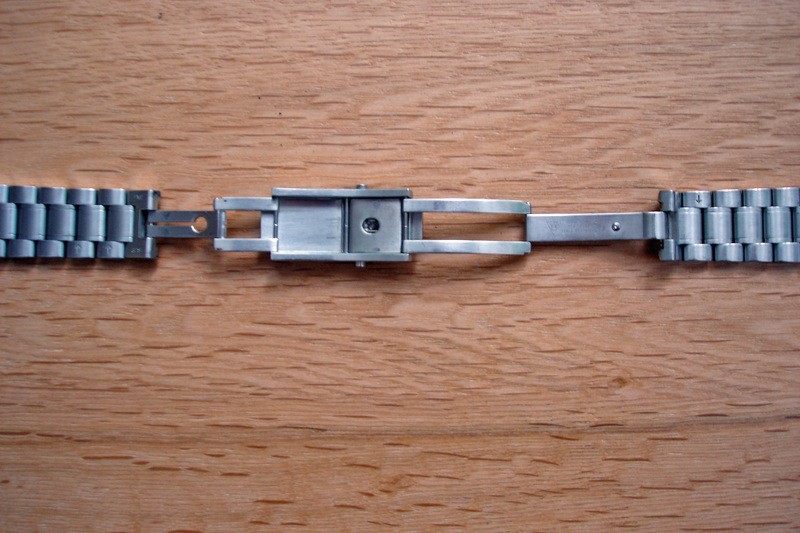
There is something to be said about Omega bracelets - they
are very good and solid. One complaint that comes up
regularly is the fact that the clasp seems to attract
scratches. While it certainly is true given the size and the
brushed finish of the clasp, these marks can be easily
removed - apparently with a green Scotch Brite pad (I have
not yet tried it). The two-button release mechanism is very
slick and simple to use, and in my opinion much cooler than
a simple fold-over clasp, and something you would expect so
see on a higher end watch. Inside you can see the folding
clasp is made from solid steel and looks very rugged, along
with the divers extension. The presence of this divers
extension does result a bit less functionality with no fine
adjustment to the sizing of the bracelet. However with the
use of the half-links provided, a comfortable fit can be
achieved.
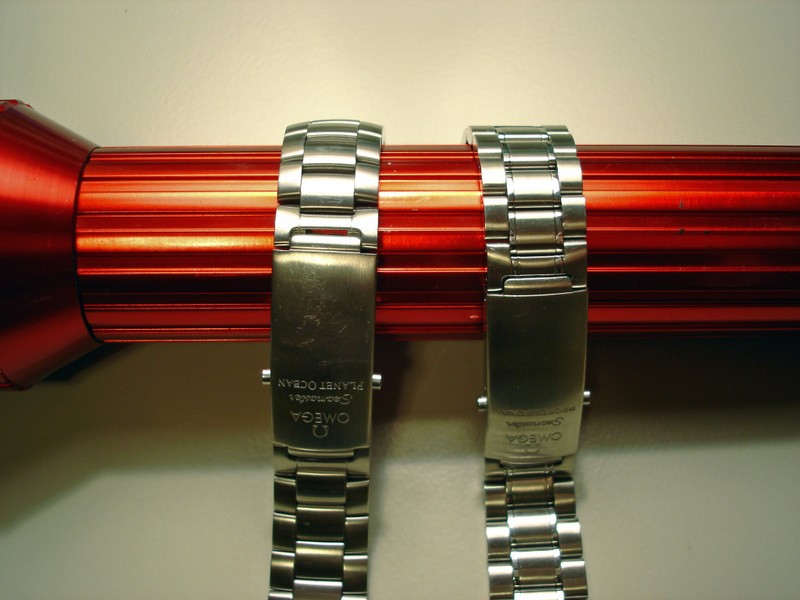
The SMP has the "Speedy" style
bracelet; brushed with polished end pieces.
The PO has a newly designed bracelet, which features satin
finished links and polished sides. : Notice how the links
have a subtle curve to them. A very simple, modern and cool
looking bracelet, and it's very comfortable to wear as
well!
|
|
MOVEMENT
|



|
|
Model
Name:
|
Planet
Ocean:
|
Seamaster
Professional:
|
|
Model
Reference:
|
2201.50
|
2255.80
|
|
Omega Calibre:
|
2500C
|
1120
|
|
Base Calibre
|
ETA 2892-A2
|
ETA 2892-A2
|
|
Movement Type
|
Automatic
|
Automatic
|
|
VPH
|
25,200
|
28,800
|
|
Power Reserve
|
48 hrs
|
44 hrs
|
The SMP is powered by the tried and true,
COSC rated 1120 movement which is based on the ETA 2892-A2.
While it is not a true "in-house" movement, it can at least
considered an in-family movement as both Omega and ETA are
part of the Swatch Group. Omega does heavily modify the
movement by adding rhodium plating and two jewels, making it
a 23 jewel movement. It runs at 28,800 BPH (8 beats per
second), uses a lever escapement and has a 44 hour power
reserve. It's a workhorse, and after getting it serviced,
mine currently runs at an impressive -1.5 seconds per
day.
The Planet Ocean has the latest incarnation of their
co-axial 2500 movement (the "C" version), which is actually
based on the same ETA base ebauche as the SMP, but has the
co-axial escapement, an additional four jewels over the 1120
(27 jewels in total) and a free sprung balance added. The
COSC rated 2500C beats at a slightly slower and unique
25,200 BPH (7 beats per second), which apparently increases
the stability of the movement along with the addition of a
larger and heavier balance. An additional benefit of the
reduced rate is that the power reserve has been increased by
4 hours to 48 hours. As a comparison to the Seamaster, my
Planet Ocean runs at just under -2 seconds per day.
The 2500C is a natural evolution of the 1120. A misnomer of
the co-axial movements is that they are a more accurate
movement. This is not necessarily true; in fact my SMP is
currently more accurate than my PO. However, the 2500C will
have longer service intervals and be more accurate in the
long term due to the reduction of friction (and wear and
tear) within the escapement. Furthermore, I was recently
talking to a watchmaker at my local Omega AD, and he was
saying that his experience with the new co-axial movements
is that they are much more precise than the 1120 movements.
Specifically he said that they are more consistent
throughout the entire power reserve range, and in
particular, the performance drop off at low power is
significantly less in the 2500C than in the 1120. He also
said that the 2500C has better amplitude performance,
especially when operating at low power reserve. It seems
that Omega has made a big step forward by incorporating the
co-axial escapement into their movements.
|
|
PRICE
|



|
|
MSRP:
|
Planet
Ocean:
|
Seamaster
Professional:
|
|
Canada
|
$4,500
|
$2,600
|
|
U.S.A.
|
$3,400
|
$2,150
|
|
U.K.
|
£1,875
|
£1,200
|
|
Australia
|
$4,900
|
$3,100
|
Here in Canada, the MSRP for the PO and SMP is $4500 and
$2600 respectively. There is a ton of value in the SMP as
you can get a very solid watch that is very comparable in
quality of build to a Rolex Submariner. The extra $1900
gives you another 300 metres of water resistance, the 2500C
co-axial movement and additional design quality.
|
|
VERSITILITY
|



|
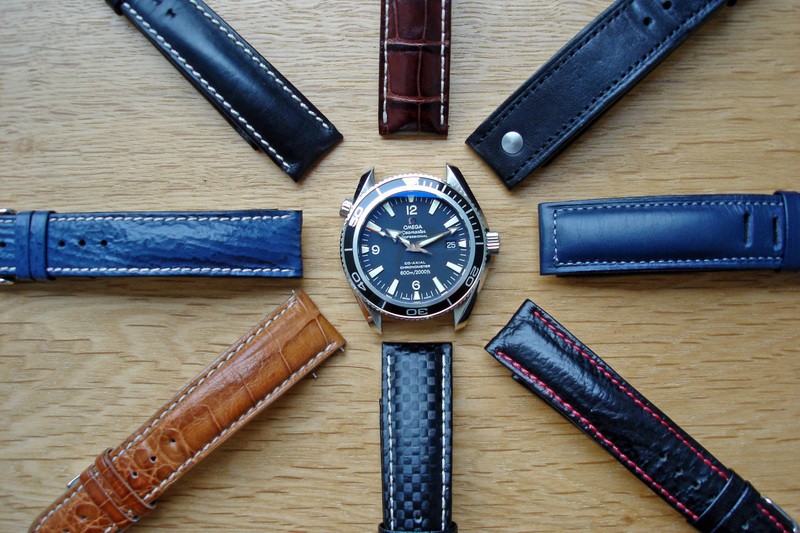 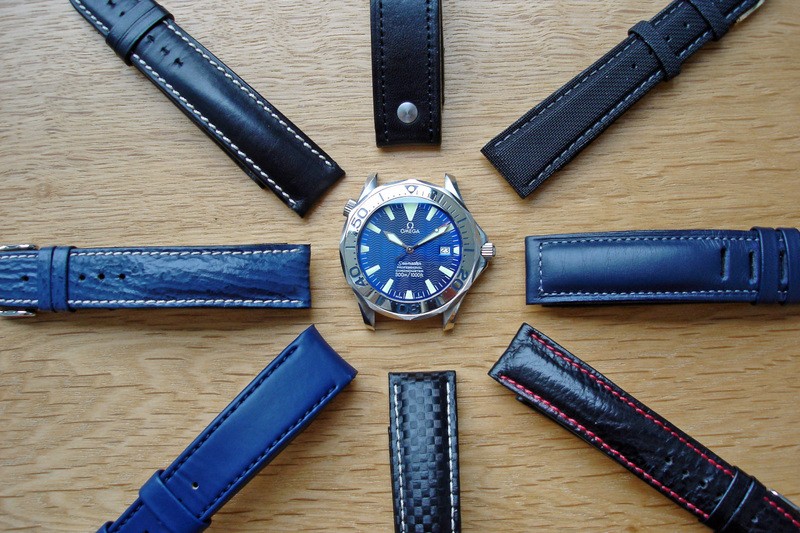
Not only do these watches look good on the bracelet, I think
they also look good on a strap. The blue face on the SMP
Electric Blue is somewhat more limiting than the black on
black of my PO. A nice benefit is that both watches share
the same lug width of 20mm!
|
|
OVERALL
|



|
|
These are two very high quality dive watches produced by
Omega. The Planet Ocean is very reminiscent of the late
1950's and early 1960's Seamaster 300 CK 2913, so it is nice
to see Omega acknowledging their roots. Movement-wise,
co-axial is clearly the direction that Omega is going, so
the demise of the 1120 SMP's is undoubtedly going to be
sooner rather than later.
After weighing these factors in each section, I must say
that that you can't really go wrong with either watch. The
PO is by all accounts a nicer watch, but more expensive.
However, it is unfair to say that you would be settling for
an inferior watch if you bought an SMP; the price,
legibility and reliability make for a lot of value.
|
|
THE
WINNER
|



|
|
A decision must be made… between these two watches; I
would choose the Planet Ocean. Yes, it is more expensive,
but you get a refined co-axial movement and a classic Omega
design. The best of both worlds!
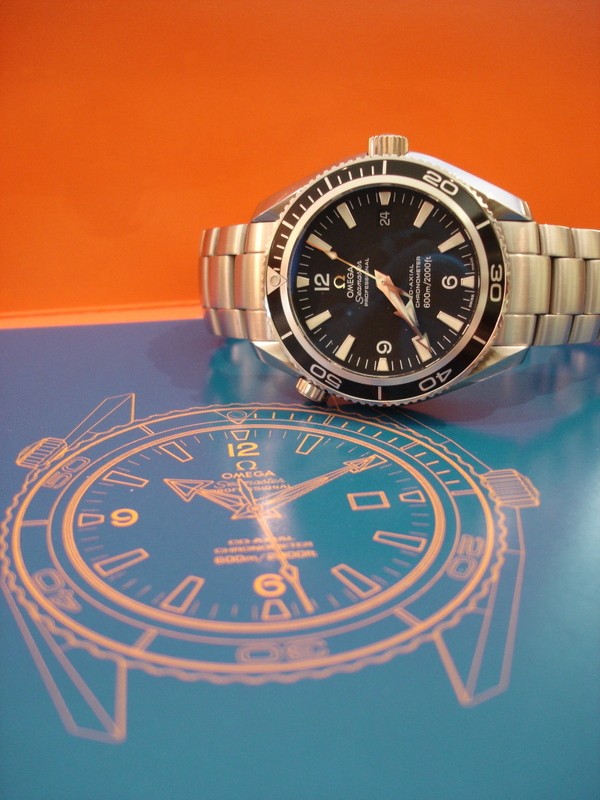
|
|
Some
Rights Reserved:
|



|
|
Permission for personal, educational
or non-commercial use is granted. The author retains all
other rights not specifically mentioned here. For all other
use please contact
the author.
|
|
|
|
|
|
Thanks for reading.
Downtown
Mike
|
|
Omega Seamaster Planet Ocean 2201.50.00, Omega Seamaster
Electric Blue 2255.80.00, 1975 Omega Genève, Omega
Seamaster Bond Chronograph 2599.80.00, Omega f300 Tuning
Fork circa 1970, Omega Speedmaster Professional "Snoopy
Award" LE 3578.51.00
|
|
Appendix:
Tale of the Tape:
|



|
|
Model
Name:
|
Planet
Ocean:
|
Seamaster
Professional:
|
|
Model
Reference:
|
2201.50
|
2255.80
|
|
Omega Calibre:
|
2500C
|
1120
|
|
Base Calibre
|
ETA 2892-A2
|
ETA 2892-A2
|
|
Movement Type
|
Automatic
|
Automatic
|
|
VPH
|
25,200
|
28,800
|
|
Power Reserve
|
48 hrs
|
44 hrs
|
|
Water Resistance
|
600 m
|
300 m
|
|
Case
Dimensions (in mm):
|
Planet
Ocean:
|
Seamaster
Professional:
|
|
Advertised Size
|
42
|
41
|
|
Top Lug to Bottom Lug
|
47.7
|
47.3
|
|
Lug Width
|
20
|
20
|
|
Width + Crown
|
44.5
|
45.7
|
|
Width: 2:00 - 8:00
|
42.7
|
41.2
|
|
Bezel Diameter
|
39.8
|
40.8
|
|
Crown Diameter
|
6.6
|
5.3
|
|
He Valve Diameter
|
5.8
|
5.3
|
|
Thickness
|
14.5
|
11.5
|
|
Bracelet
Dimensions (in mm):
|
Planet
Ocean:
|
Seamaster
Professional:
|
|
Bracelet Number
|
1580/952
|
1610/930
|
|
End Link Number
|
952
|
930
|
|
Width at Case
|
19.6
|
19.6
|
|
Width at Clasp
|
17.6
|
17.6
|
|
Thickness at Case
|
4.7
|
3.5
|
|
Thickness at Clasp
|
4.7
|
3.5
|
|
Clasp Width
|
18.1
|
18.1
|
|
Clasp Thickness
|
6.4
|
6.4
|
|
Weight (in
grams):
|
Planet
Ocean:
|
Seamaster
Professional:
|
|
Head
|
90
|
76
|
|
Bracelet
|
86
|
72
|
|
Total
|
176
|
148
|
|
MSRP:
|
Planet
Ocean:
|
Seamaster
Professional:
|
|
Canada
|
$4,500
|
$2,600
|
|
U.S.A.
|
$3,400
|
$2,150
|
|
U.K.
|
£1,875
|
£1,200
|
|
Australia
|
$4,900
|
$3,100
|
|
|
|
|
|
|
|
|
|



















